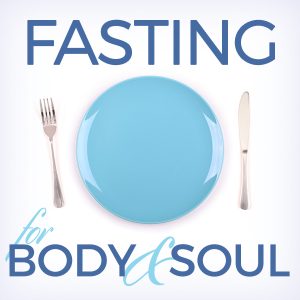When You Fast, Are You Degrading Your Body?
This is the fourth piece in a series on fasting. Read part 1 here, part 2 here, and part 3 here.
The belief that fasting is, or even should be, bad for our bodies is hard to shake off. It has two sources, one from history, the other from science. Both are mistaken.
Let’s deal with the historical source here.
A Starving Monk, Whipping Himself
We all have a mental picture — fed by Hollywood — of an ashen-faced medieval monk, lashing himself to bits and starving himself to death in order to subdue his sinful flesh. That picture is neither pretty, nor fair. Anti-Christian writers such as Dan Brown pawn off this myth to distort the spiritual disciplines of Christian history.
I’m not saying no such monk ever lived and died an early death. I’m saying that such extreme practices contradict the balanced, Christian view of the spiritual life.
A Unity of Body and Soul
We are, each of us, unities of matter and spirit, body and soul. We are made from the dust of the earth and the breath of God. We’re neither mere matter nor ghosts trapped in bodies. We’re bodily persons. We are created good, but fallen — body and soul.
God came to earth, not as an angel or a ghost, but as a man. He became incarnate. He became flesh. In His body, He died for our sins. He rose — bodily — from the dead. He ate breakfast with His disciples. Forty days later, he ascended, body and all, into heaven.
That’s why we look forward not just to a vaporous existence as souls in heaven, but as people with new bodies, in a new heaven and a new earth.
Good spiritual practices should bolster these truths, not deny them.
Gnosticism? None for Me, Thanks
God calls us to repent of our sins and discipline ourselves body and soul. As Paul wrote to the church in Corinth: “I pommel [that is, chastise] my body and subdue it, lest after preaching to others I myself should be disqualified.” (1 Cor. 9:27)
God sometimes calls us to suffer severe pain, even to sacrifice our bodies for a greater good. After all, “greater love has no man than this, that a man lay down his life for his friends.” (John 15:13) But the normal Christian life is about subduing our sinful desires, and training our bodies, minds, and souls to know God, to glorify Him and to enjoy Him forever. It’s not about degrading our bodies, or treating our bodies as evil.
Going out of your way to harm your body for spiritual reasons is not just bad. It’s Gnostic. Gnosticism was the first serious heresy that early Christians had to deal with. Gnostics taught an extreme dualism between matter and spirit. Matter, they thought, was evil, and spirit was good. As a result, the body, and what you do with it, didn’t really matter. What mattered was the spirit. That’s why Gnostics denied the real incarnation and resurrection of Jesus. Why would God, a great spirit, assume evil matter?
These ideas struck at the very heart of the Christian faith. That’s why the Church fathers fought vigorously against them. And when extreme forms of self-flagellation emerged in the Middle Ages, the Church condemned that as well. Self-discipline is one thing. Self-torture is another.
Still, even among devout Christians, Gnosticism has a way of creeping back in. (Read Nancy Pearcey’s great new book Love Thy Body as an antidote.)
Body and Soul United Together
True Christian fasting, as Susan Mathews explains, “is not a pitting of the spirit against the flesh, but rather body and soul united together against sin, body and soul converted together to the Lord. The whole man must cooperate with God’s grace. The whole man must love the Lord.”
In the same way, the great Orthodox theologian Alexander Schmemann wrote that true “Christian asceticism is a fight, not against but for the body.”
Jay Richards is the Executive Editor of The Stream and an Assistant Research Professor in the Busch School of Business and Economics at the Catholic University of America. Follow him on Twitter.



